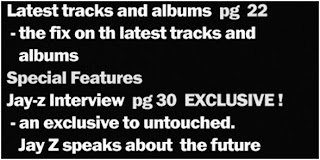 When making my college magazine I was unfamiliar with photoshop and was not sure how to navigate and use the tools around Photoshop, something that had improved on making my music magazine. I believe this is evident in the quality difference between the two products. As well as this I also believe that my photo taking skills have also improved and I have learnt to now frame pictures more acurately which helped me give my music magazine a more professional look than my college magazine. In adittion I learnt that I am able to take better quality pictures in a studio rather than outside the college which will help me to make a decision on how I take photographs in the future.
When making my college magazine I was unfamiliar with photoshop and was not sure how to navigate and use the tools around Photoshop, something that had improved on making my music magazine. I believe this is evident in the quality difference between the two products. As well as this I also believe that my photo taking skills have also improved and I have learnt to now frame pictures more acurately which helped me give my music magazine a more professional look than my college magazine. In adittion I learnt that I am able to take better quality pictures in a studio rather than outside the college which will help me to make a decision on how I take photographs in the future. Whilst making my music magazine I was also aware of some mistakes that I may have have made in the production of my college magazine such as time management. Although I met the deadline I do not feel as though I gave myself enough time to make my college magazine look good enough, this encouraged me t work strictly to personal deadlines I set during production of my music magazine.
This whole coursework unit has also helped to learn how to balance media studies with my other three courses, which is something that I feel is very important in preparing me for work life when I am older as I will have other priorities in my liffe aswell as work
However, during both projects things did not always turn out as I wanted because complicated ideas I had and my limited skills on Photoshop. This taught me how to compromse and inturn did help me meet deadlines as I was not spending hours wasting time trying to create a vision that just was not going to happen. For example whilst making my music magazine contents page I tried to add a film reel of pictures behind the models head but due to my lack of Photoshop expertise I was not able to, and so compromised by leaving out this feature and adding a faded version of the masthead instead.



















